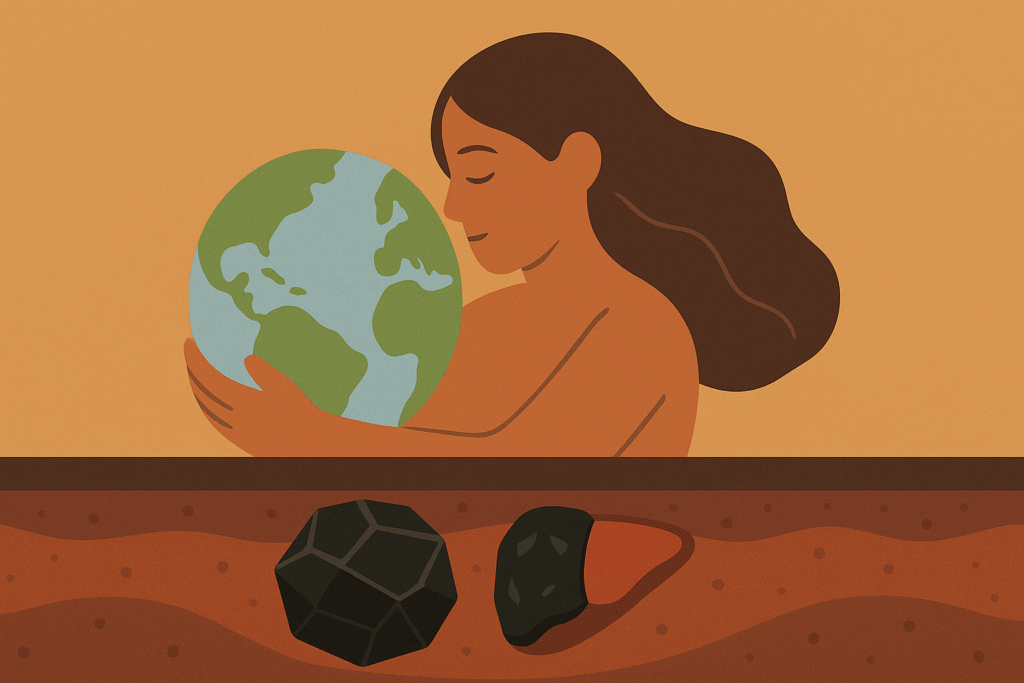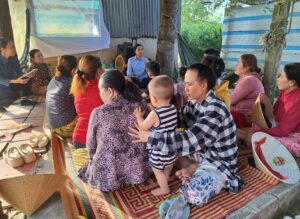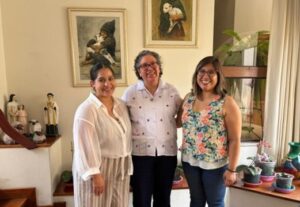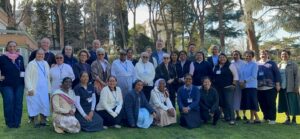Par Margaret Lynch, coordinatrice Justice et Paix, GSIJP
« Le charbon est le foie de la Terre Mère. Il doit rester dans son corps pour qu’elle soit en bonne santé.»
— Roberta Blackgoat, aînée Navajo
Le changement climatique n’est plus seulement un problème environnemental : c’est la crise des droits humains la plus grave de notre époque. Chaque année, nous assistons à des catastrophes climatiques plus fréquentes et plus graves : inondations, sécheresses, incendies de forêt et phénomènes météorologiques extrêmes qui aggravent l’insécurité alimentaire, déplacent des communautés et créent une vague croissante de réfugiés climatiques.
Au cœur de cette crise se trouve l’utilisation continue des combustibles fossiles.
Lors de la 59e session du Conseil des droits de l’homme des Nations Unies, Elisa Morgera, rapporteuse spéciale sur les droits de l’homme et le changement climatique, a présenté un rapport percutant appelant à une transition rapide à l’échelle mondiale vers l’abandon des combustibles fossiles, principal facteur du changement climatique.
''Les impacts interdépendants, intergénérationnels, graves et généralisés du cycle de vie des combustibles fossiles sur les droits de l’homme, associés à six décennies d’obstruction climatique, imposent un abandon des énergies fossiles urgent de l’ensemble de nos économies, pour une transition juste, efficace, fondée sur les droits de l’homme et transformatrice», a-t-elle écrit.
(Regardez la déclaration d'Elisa Morgera dans la vidéo ci-dessus et lisez le rapport complet ici)
Le rapport de Mme Morgera met également en garde contre le fait que l'industrie des combustibles fossiles s'emploie activement à occulter le lien entre leur utilisation et l'aggravation des phénomènes climatiques auxquels nous sommes confrontés. Elle appelle les gouvernements à garantir l'accès du public à ces informations cruciales, à interdire la publicité pour les combustibles fossiles et à interdire l'octroi de nouvelles licences d'exploitation de ces combustibles.
Cela marque un tournant. Historiquement, la défense du climat et le travail en faveur des droits humains étaient traités comme des sphères distinctes. Les combustibles fossiles, par exemple, n'ont jamais été explicitement mentionnés dans une résolution du Conseil des droits de l'homme. Aujourd'hui, il est de plus en plus évident que cette distinction ne nous sert plus à rien.
En réalité, abandonner progressivement les combustibles fossiles pourrait bien être la mesure la plus efficace que les États puissent prendre pour remplir leurs obligations en matière de droits humains. Le Comité des Droits de l'Enfant des Nations Unies a souligné que les États ont des responsabilités extraterritoriales : ils peuvent être tenus responsables lorsque leurs actions (ou leur inaction) portent préjudice à des enfants dans d'autres régions du monde.
Le changement climatique, alimenté par les combustibles fossiles, compromet clairement le droit de chaque enfant à un avenir sûr, sain et heureux.
Notre réponse du Bon Pasteur
En tant que Notre-Dame de Charité du Bon Pasteur, nous nous engageons à lutter vigoureusement contre le changement climatique, reconnaissant que la protection de notre maison commune et la prise en charge des plus vulnérables sont inextricablement liées. Notre Document de Position sur l'écologie intégrale nous appelle à reconnaître que« la dégradation écologique et la souffrance des peuples et des formes de vie à travers le monde sont inextricablement liées ; elles ne forment qu'un seul phénomène ».”
Nous ne pouvons ignorer que les personnes les plus touchées par le changement climatique sont souvent celles qui sont déjà marginalisées par l'injustice économique et sociale – celles-là mêmes que nous servons à travers notre mission de réconciliation et de guérison du Bon Pasteur. Les femmes, les filles, les enfants, les communautés autochtones et les personnes vivant dans la pauvreté sont celles qui portent le plus lourd fardeau des impacts climatiques, tout en contribuant le moins au problème.
Notre fondement spirituel nous enseigne que la réconciliation avec notre Terre exige une nouvelle conscience, une nouvelle identité et de nouveaux comportements centrés sur la parenté de toute la Création. Comme le pape François nous l'a rappelé dans Laudato Si’, nous avons besoin d’ ''une nouvelle approche écologique capable de transformer notre façon d'habiter le monde, nos modes de vie, notre relation aux ressources de la Terre et, en général, notre façon de considérer l'humanité et de donner la vie.''
Un appel à l'action
Nous avons tous un rôle à jouer pour promouvoir une réponse juste et respectueuse des droits humains au changement climatique. Voici comment :
- Informez: vous et informez les autres sur le rôle des combustibles fossiles dans le changement climatique et la souffrance humaine.
- PlaidoyerPlaidoyer : Si vous préparez des soumissions pour les EPU ou les organes conventionnels (p. ex., la CDE, la CEDAW), incluez un langage clair appelant à la l’abandon des énergies fossiles de nos économies.
- Mobiliser: Rejoignez et soutenez l’Initiative pour un traité de non-prolifération - des combustibles fossiles, que ce soit à titre individuel, organisationnel ou provincial. Encouragez les autres à faire de même.
Nous ne pouvons pas attendre que d’autres agissent. En tant que Bons Pasteurs, nous sommes appelés à être les porte-parole de ceux qui n’ont pas de voix, y compris notre Terre elle-même et les générations futures qui hériteront des conséquences de nos choix d’aujourd’hui.
En prenant soin de notre maison commune, nous prenons soin des plus vulnérables d’entre nous !





